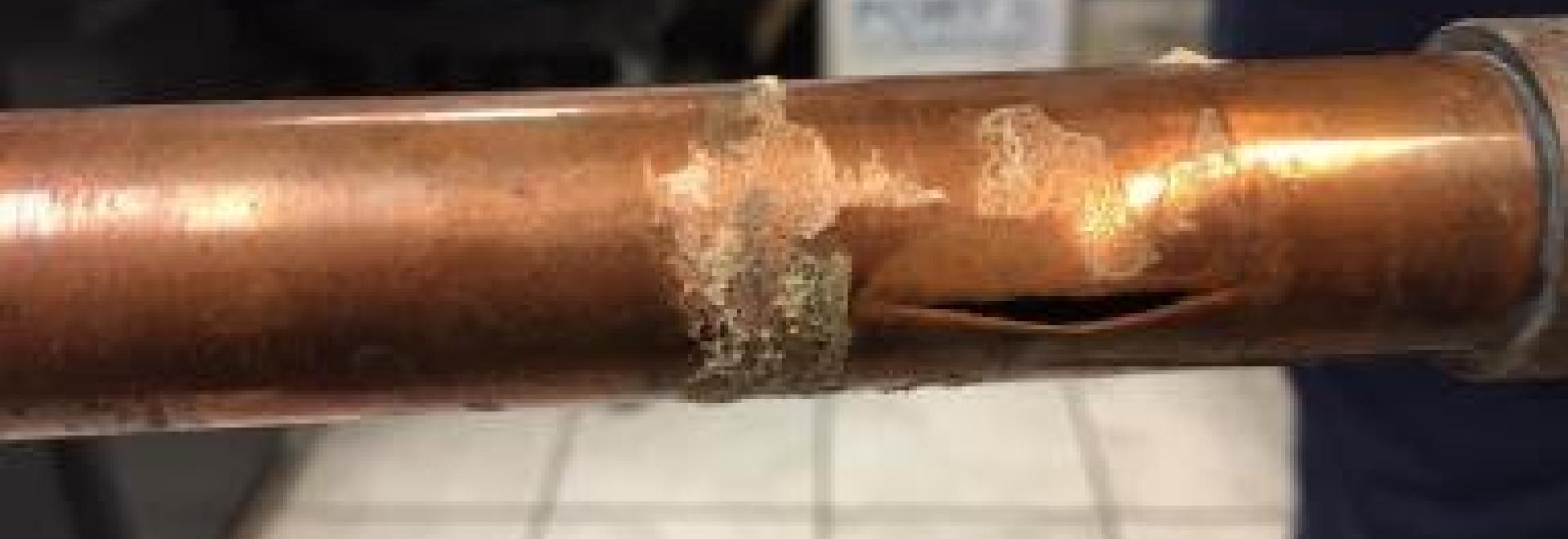
Freezing temperatures in Oklahoma can strike unexpectedly any time between mid-October and mid-April. Even a short period of 30 to 32-degree weather can lead to frozen pipes and thousands of dollars in water damage.
Pipes most at risk include those running through uninsulated areas like attics, garages, crawl spaces, basements, and exterior walls. Outdoor faucet hookups are especially vulnerable. If a frost-proof faucet cannot drain properly, usually due to a hose left attached, ice can form and rupture the faucet pipe inside a wall or crawl space. Unfortunately, many homeowners don’t discover the damage until spring when they turn on the faucet.

Signs You May Have a Frozen or Burst Pipe
Frozen or burst pipes aren’t always obvious. If you notice little or no water coming from your faucets, strange noises when you turn on the tap, or a sudden drop in water pressure, there could be a freeze somewhere in your system. Other warning signs include unusual odors from drains, water discoloration, or an unexpected spike in your water bill.
How to Prevent Frozen Pipes
You can protect your home and wallet with proactive winter plumbing maintenance. Start by draining and disconnecting outdoor lines such as garden hoses, sprinkler systems, and pool lines. Shut off the supply valves to exterior faucets and leave the hose bibs open to let any remaining water drain out.
For pipes inside your home, especially those located in unheated areas like basements, crawl spaces, garages, or under kitchen and bathroom cabinets, insulation is essential. Wrapping these pipes with foam sleeves or using heat cables can significantly reduce the risk of freezing. Improving insulation in those unheated spaces also helps keep temperatures more stable.
Inside the house, keep cabinet doors open when temperatures dip to allow warm air to circulate around plumbing. On especially cold nights, let your faucets drip slightly, both hot and cold sides, to maintain water flow and relieve pressure if freezing occurs. Avoid turning your thermostat down too low at night or when you leave the house, as keeping a steady, warm temperature can make all the difference in preventing frozen pipes.
In some cases, the best long-term solution is to permanently relocate vulnerable pipes to conditioned spaces or add heating to problem areas. Your plumbing professional can help evaluate your home’s risk areas and suggest upgrades that will prevent future issues.
What to Do If Your Pipes Freeze
If you turn on a faucet and only a trickle comes out, it's possible your pipes are frozen. First, turn on all faucets. This helps relieve pressure and lets you know when the ice starts to melt. Then, try to locate the frozen section. Common areas include
- Exterior walls
- Under sinks near exterior walls
- In unheated crawl spaces
- Unheated Attics (previous slab leak repairs are commonly rerouted through attics)
To thaw the pipe, apply gentle, steady heat. A hair dryer, heating pad, or even towels soaked in hot water can help. Never use an open flame. Continue gently applying heat until water pressure is restored. Check other pipes as well; if one is frozen, others may be too. If you're not confident in thawing them safely or you can’t access the affected area, call Pippin Brothers immediately.
What to Do If a Pipe Bursts
If a pipe bursts and is spewing water into your home, shut off your home's main water supply as quickly as possible to prevent additional flooding. Then open all faucets to drain the system and reduce pressure. Call Pippin Brothers right away for emergency plumbing service. Burst pipes can cause significant water damage in a short amount of time, so fast action is key.
Don’t Forget About Spring
As spring approaches and it’s time to water your lawn or use your outdoor faucet for the first time in months, keep an eye out for potential issues. An unused pipe may have burst over the winter without your knowledge. Turn on exterior faucets slowly and inspect for leaks. If you see anything unusual, turn off the water and call Pippin Brothers.
Trusted Plumbing Experts in Lawton, Fort Sill, and Duncan
Since 1978, Pippin Brothers has served the Lawton community with professional plumbing services focused on long-term solutions. Whether you’re preparing your home for freezing temperatures, dealing with a frozen pipe, or recovering from a burst one, we’re here to help.
Call 580-215-0968 or contact us online to schedule your plumbing service today.
Want to prevent frozen pipes this winter?
Call our team and prep your plumbing
580-215-0968